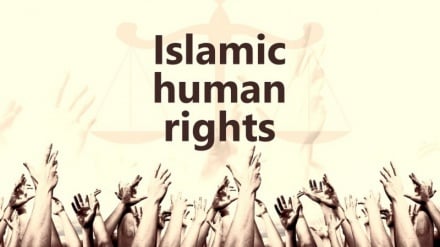Islamic Human Rights (16)
Today, we study the different viewpoints of Islamic and Western human rights in regard to right of existence.
As a reminder, last week we mentioned the first human right, which is the right to existence. Today, we continue this discussion.
The right to existence is the most fundamental human right. It is the main asset and a major divine blessing for human beings. In fact, other rights are rooted in the right to existence. Upon the birth of an infant, his first right is the right of existence and the right to live. Undoubtedly, the divine religion of Islam has also considered the right to existence as one of the most important human rights. Meanwhile, what separates Islamic ideology from other ideologies, is the reference of Islam to spiritual existence. In fact, Holy Quran considers two existences for mankind, which are material and spiritual existence.
The right to material existence is not just limited to mankind. All of the world’s creatures such as plants and animals maintain the right to live. For instance, a seed that is placed inside soil grows as the result of a number of factors such as water, soil, and sufficient light. This is a vegetative existence. Higher than this phase is the life of animals. In fact, animals also make use of divine blessings, and maintain emotions and sentiments. However, when Holy Quran speaks of human life, the name of mankind is mentioned next to angels.
The 18th ayah of Surat al-‘Imran in Holy Quran notes: “Allah bears witness that there is no god except Him – and so do the angels and those who possess knowledge – maintainer of justice, there is no god but Him, the Almighty, the All-wise.”
Spiritual life is in close bond to man’s soul. In the view of Quranic teachings, spiritual existence is tied to faith in God and good deeds. Hence, only those who are faithful understand spiritual life.
The 169th ayah of Surat al-‘Imran in Holy Quran notes: “Do not suppose those who were slain in the way of Allah to be dead; rather they are living and provided for near their Lord.”
In this ayah, we realize the status of martyrs, and understand that they maintain a spiritual existence. In fact, mankind is an eternal creature, who continues to maintain a spiritual existence whenever his physical existence in the material world ends.
The spiritual existence which has been mentioned in Holy Quran is different to the life which is based on the necessities of our material existence. First of all, mankind should realize that God Almighty is omnipotent and the entire universe is under His authority, and secondly mankind is an immortal creature, whose existence is not limited to the material world.
Upon establishment of a deep-rooted belief on these two facts, man’s interpretation of the world of existence and his behavior in the material world drastically changes. In this case, he leads a life in which there is no trace of misdeeds.
The 24th ayah of Surat al-Anfal in Holy Quran notes: “O you who have faith! Answer Allah and the Apostle when he summons you to that which will give you life. Know that Allah intervenes between a man and his heart and that toward Him you will be mustered.”
The 36th and 122nd ayahs of Surat al-An’am in Holy Quran point out that although disbelievers maintain a physical life in the material world, they lack a spiritual life, while those who are faithful maintain material and spiritual lives, both. Hence, these ayahs, in addition to 80th and 81st ayahs of Surat al-Naml in Holy Quran refer to disbelievers as dead people.
In the view of Holy Quran, one of the most important factors in maintenance of a spiritual life is faith in God and implementation of good deeds. Several ayahs of Holy Quran point out that the most important and main factor for maintenance of a spiritual life is faith in God and the divine religion of Islam.
God in the 24th ayah of Surat al-Fatir in Holy Quran notes: “Nor are the living equal to the dead. Indeed Allah makes whomever He wishes to hear, and you cannot make those who are in the graves hear.”
The second factor which Holy Quran has stated that leads to a spiritual life is implementation of good deeds.
The 97th ayah of Surat al-Nahl in Holy Quran notes: “Whoever acts righteously, whether male or female, should he be faithful, We shall revive him with a good life…”
In the 24th ayah of Surat al-Anfal, response to God’s invitation is introduced as a factor that leads to maintenance of spiritual life. God invites mankind to be faithful and whoever responses to this invitation maintains a spiritual life. This invitation is carried out by prophets and divine revelations, and Holy Quran is the symbol of this divine invitation. As it was said, acceptance of the invitation and guidelines of the Prophet of Islam, Mohammad (Blessings of God upon him and his progeny) is the manifestation of divine invitation, and leads mankind toward maintenance of a spiritual existence.
God Almighty also considers Holy Quran as a source of spiritual existence. Meanwhile, undoubtedly, wisdom and innate nature of mankind invite him to maintain faith in God.
In the view of Holy Quran, spiritual life is shaped upon maintenance of faith in God, which brings about countless blessings.
One of the other signs of spiritual existence is peace of mind. The 62nd and 63rd ayahs of Surat Yunus in Holy Quran note: “Look! The friends of Allah will indeed have no fear nor will they grieve. – Those who have faith, and are Godwary.”
MR/ME


